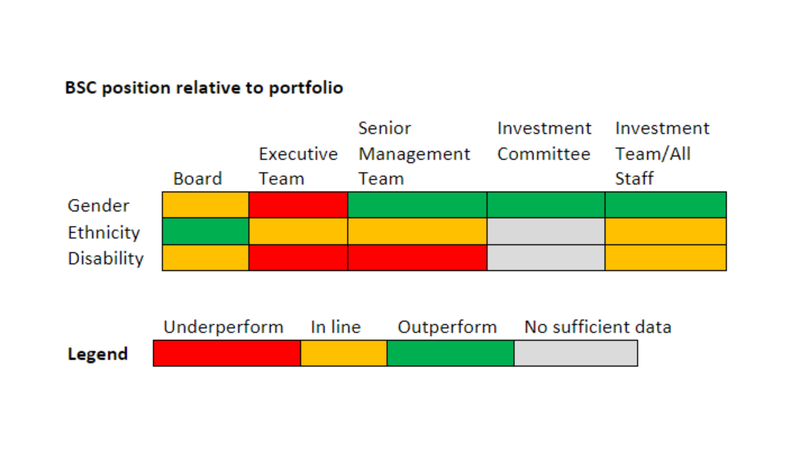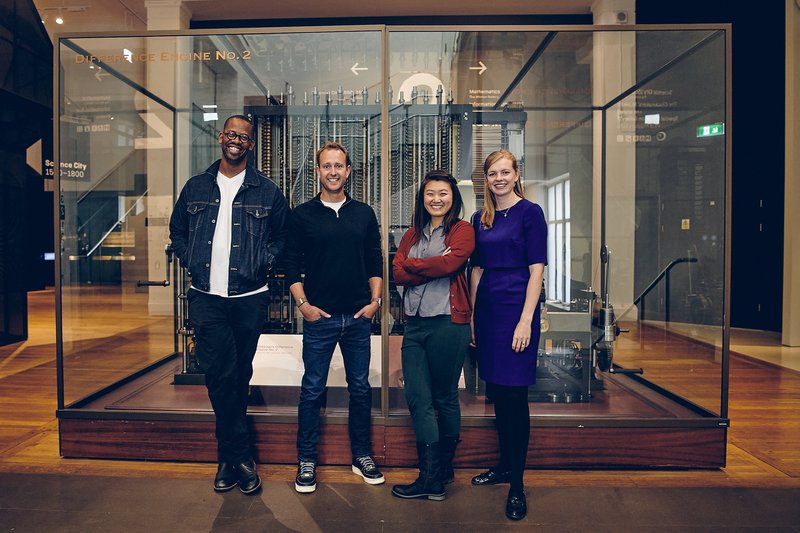Environmental Social Governance and Equity, Diversity and Inclusion
Reducing inequalities in the UK through our market building and investing activities is at the heart of our mission. In order to deliver our mission, we must also invest responsibly by considering ESG risks and opportunities and manage potential negative impacts from our investments.
This section aims to set out our Equity Diversity and Inclusion (EDI) and broader ESG commitments and initiatives, and the impact they have had on our organisation and the wider social impact investment sector.
BSC as an investor
We understand that our ESG approach is integral to our role as impact investor and market-builder. Our Responsible Investment Policy forms the foundation of our ESG approach, and at its essence states that the fund managers that receive investment from BSC are required to adopt our Responsible Business Principles and an exclusionary negative screen.
In 2023, we made the following changes to our ESG approach:
Became a Principles for Responsible Investment Signatory
The Principles for Responsible Investment are a market-leading standard that sets out a baseline requirement to be considered a responsible investor. While we have previously considered ourselves to be aligned and compliant with the principles, we believed that it was important to publicly recognise that in order to have positive impact, we must ensure that we are not creating negative harm elsewhere.
Gained better understanding of environmental performance – including in our Schroder BSC Social Impact Trust (SBSI) portfolio
SBSI currently reports greenhouse gas emissions data for 52% of the portfolio. We believe this represents a relatively high level of coverage for the profile of frontline investments in the portfolio, the majority of which are small and medium-sized social organisations, rather than larger or listed companies that are the current focus of emissions disclosure requirements. Over 2024 and as part of our improvement plan for our B Corp status, we will be working to understand our environmental footprint, working with our buildings manager to understand our energy usage and make improvements over time.
Piloted our new Social Property ESG Due Diligence Questionnaire
We developed this tool in 2022 and tested it in 2023 with two new investments. This sector-specific tool has allowed the deal teams to better identify ESG risks material to the property sector and provide reference points for ESG best practice. Lessons from the pilot have informed the planned rollout of this tool for the existing property portfolio and new property investments going forward.
Within ESG, we have been focusing on equity, diversity and inclusion (EDI) as a key priority across our entire investment process, and see a focus on EDI as a source of value across every market system.
Embedding an EDI lens into our investment process:
In 2023, we have focused on two key priorities to further embed an EDI lens into our investment process:
Improved our EDI due diligence approach to support investment teams
The updated framework, developed with support from The Social Investment Consultancy (TSIC), assesses fund managers’ EDI practice across seven criteria, including culture and mindset, governance and decision-making, and data and accountability. This assessment informs EDI Action Plans agreed with fund managers on key areas of improvement, if necessary. In 2023, we piloted the tool across two live due diligence processes with two new fund managers, and benchmarked EDI practice across a subset of our existing portfolio. In 2024, we will roll the tool out for all new investments.
Improved transparency on diversity data within BSC and our portfolio
Over the summer of 2023, we collected data across our portfolio on the extent to which fund managers are diverse-led, the diversity of the leadership of their portfolio companies, pay gap reporting, and barriers and resources to implementing EDI. This year we changed the data collection process, by adding questions on socioeconomic status and challenges to implementing EDI, as well as organised a session with fund managers to obtain feedback, share back and reflect on the results from last year’s survey. The next section shows the findings from the survey.
BSC EDI Fund Manager Survey findings
We surveyed 31 fund managers and social banks in our portfolio and received 27 responses, increasing the portfolio coverage of survey responses by value from 65% to 77% compared to last year. Out of the remaining 23%, 10% were not included in the survey and the remaining 13% did not respond. It is worth noting that a modified version was sent to venture capital (VC) firms, given their smaller average team size.
While our sample size is considerably smaller than the sample sizes in the industry averages referenced below, we have attempted to compare the findings below against these to put our findings into context. The section below summarises the findings across our portfolio. BSC’s own data is included in the “BSC as an organisation” section.
Explore the data in more detail in the accompanying dashboards.

BSC as a market builder
Recognising our influence as a Limited Partner (LP) and a market-builder, we have also contributed to shape policy and industry initiatives on ESG and EDI, notably:
Investment Committees of the Future
Launched a programme with Good Finance designed to increase the numbers of individuals bringing improved diversity and greater lived experience to investment decision-making in the social investment sector. The programme provides insight into how investment committees work and how to build the skills and knowledge to join one for individuals who have the skills to be on an Investment Committee (IC), but may not have the knowledge, confidence or full understanding of what it entails or networks to be appointed on one. At time of publication, the programme had 20 participants who completed the course, and two participants who have joined ICs in an observer or voting role. Our EDI survey found that ICs have the lowest diversity compared to the other levels surveyed [15], so this programme aims to close this gap.
Policy
Submitted a response to the FCA’s consultation paper on the Sustainability Disclosure Requirements (SDR) on the proposed “Sustainability Impact Label” and collaborated with bodies such as the British Private Equity & Venture Capital Association (BVCA) and the Global Impact Investing Network (GIIN) on their own consultation responses.
Market-building
Became the third LP to become an Investing in Women Code signatory, to signal our support for the development and expansion of the Code to LPs. Supported industry initiatives such as VentureESG, ESG_VC, Diversity VC, Diversity Forum and the Equality Impact Investing Project (EIIP). Contributed to JRF’s Living Wage Roundtable, VentureESG’s White Paper #3 on the LP Perspective on ESG in venture capital, and the Equality Impact Investing Project’s Equalising Deal Terms project.
Spotlight: Ada Ventures: Inclusive Alpha®
Ada Ventures started with the ambition to invest in overlooked founders addressing the needs of underserved groups. Five years later, the firm argues its mission to invest with an inclusive lens is more urgent than ever. It has introduced a new movement called “Inclusive Alpha”, an investment approach where an inclusive lens is prioritised in every part of the investment process.

BSC as an organisation
We recognise that it is equally important that how we conduct ourselves as an investor and a corporate citizen contributes to positive social and environmental impact.
Becoming a B Corp
We are proud that in July 2023, we officially became a certified B Corp. We embarked on the B Corp journey to hold ourselves accountable to the standards that we hold others to across the entirety of our business operations. We scored 137 points of a possible 200, significantly surpassing the minimum threshold of 80 and sector benchmarks. To put this into context, the average score across fund managers and social banks in our portfolio is 128, and the average score for financial services firms[18] is 97. We scored highest in the areas of governance, customers and workers. Our areas for improvement are environment and community. We intend to address this by measuring our emissions as an organisation and in our portfolio, through more proactive engagement with our suppliers around their environmental impact and on EDI, and more local community volunteering initiatives.
Diversity and inclusion within BSC
In terms of diversity in our own organisation, we perform broadly in line with our portfolio, but underperform in terms of gender and disability diversity in our Executive Team. We outperform in terms of gender diversity in our Senior Management Team and Investment Committee (see the table below) [19]. Our Board is more ethnically diverse than the majority of our portfolio and the wider industry. While our investment team is more ethnically diverse than the average PE & VC industry (27% vs 17%)[20], and versus the UK population (27% vs 16.7%), we recognise we operate in regions and communities with higher proportions of non-white populations and are working to improve the diversity of staff from ethnic minority backgrounds, particularly in the most senior roles.
This year our Board has developed its own EDI plan, published its Board Diversity policy, and acted to extend and recruit more diverse voices to their membership. After an extensive search, Alison Evans and Rosie Ginday MBE were appointed to bring further impact expertise to the Board. We recognise that we need to do more to increase diversity in the most senior roles, so we will set targets for our senior leadership and wider staff in addition to our Board objectives, ahead of the FCA’s proposed diversity and inclusion regulation.
This builds on our previous efforts to create a more distributed leadership structure, and develop potential leaders through the formalisation of our Senior Management Team two years ago. The Senior Management Team consists of 21 staff at Managing Director or Executive level, who hold a high degree of autonomy over their respective areas and influence top organisational priorities. This group is more diverse than our Executive Team from a gender and ethnicity perspective (over half female representation and up to a quarter ethnic minority representation, versus up to a quarter female representation and no ethnic minority representation, respectively). The Senior Management Team members are budget holders, responsible for critical functions, and help set and deliver organisational strategy.
We have also developed a mutual mentoring programme, where an Executive Team member is paired with an employee from a minority background, and allows colleagues from minority backgrounds to grow and progress in their leadership skills, while supporting leaders to be more inclusive. Our 2022 staff survey also identified that colleagues from ethnic minority backgrounds had a less positive employee experience compared to white staff. As a result, we have organised a Diversity Dialogue Group, to understand why this is the case and identify ways in which BSC can close the gap in this experience.

Spotlight: Social Investment Business (SIB) and Data Decision-Making
SIB plays a leading role in increasing diversity and inclusion in the sector, by hosting and being a founding partner to the Diversity Forum and Equality Impact Investing Project, as well as sharing its Diversity Data dashboard publicly.

End notes
- →
-
Women in UK Venture Capital 2023 Report
→ -
BVCA and Level20 Diversity & Inclusion 2023 Report
→ -
Women in UK Venture Capital 2023 Report
→ -
Diversity Forum Inclusive Impact: Social Investment Sector Report 2018
→ -
Investing in Women Code 2023 Report
→ -
BVCA and Level20 Diversity & Inclusion 2023 Report
→ -
Diversity Forum Inclusive Impact: Social Investment Sector Report 2018
→ -
BVCA and Level20 Diversity & Inclusion 2023 Report
→ -
Diversity Forum Inclusive Impact: Social Investment Sector Report, 2018
→ -
House of Commons Research Briefing, Disabled people in employment June 2023
→ -
FCA Understanding approaches to D&I in financial services 2022
→ -
PwC, Gender pay gap and diversity in financial services, March 2022
→ -
ONS, Gender pay gap in the UK 2022
→ -
https://bigsocietycapital.com/about-us/equity-diversity-inclusion/equitable-investing/
→ -
Just Entrepreneurs, Ada Ventures becomes first VC firm in Europe to support founders with cost of childcare, Oct 2023
→ -
Extend Ventures, Diversity Beyond Gender: The State of the Nation for Diverse Entrepreneurs
→ -
Includes B Corp financial services firms investing in equity in developed markets
→ -
For a side-by-side comparison, please see the charts on our website here
→ -
BVCA and Level20 Diversity & Inclusion 2023 Report
→
